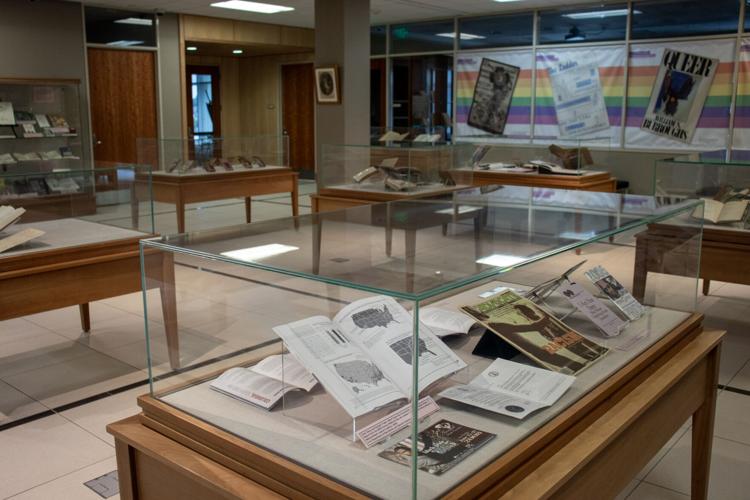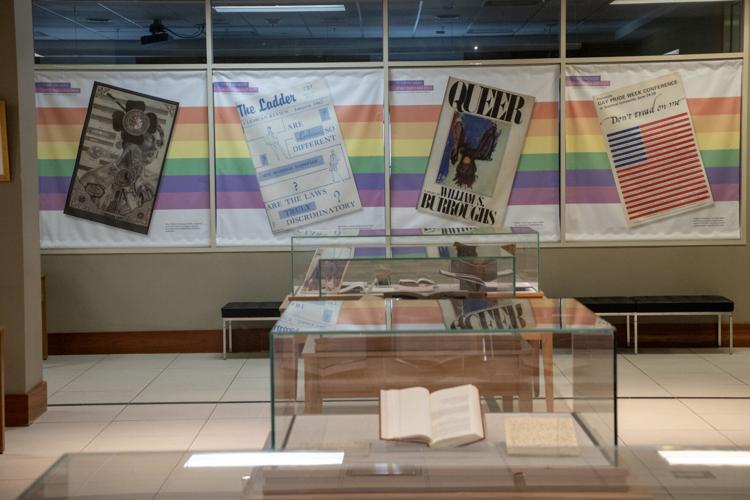COLUMBIA — LGBTQ+ history is often overlooked and diminished. Questioning what is preserved and what is left out is important when considering our understanding of the LGBTQ+ community and its history.
In the Thomas Cooper Library, past the students and their Starbucks, the Hollings Special Collections Library features an exhibit that highlights queer history, pulling from the university's extensive archives to paint a fuller picture.
The exhibit, “To tell the secrets of my nights and days: LGBTQ History in South Carolina and Beyond,” combines pieces held in the Caroliniana library, which focuses on South Carolina history, and the Irvin Department of Rare Books and Special Collections, which is a more traditional Special Collections library. It tells a story of queer history across themes, from ancient Greece to pulp novels to Walt Whitman and the USC student newspaper.
Graham Duncan, Head of Collections at the Caroliniana, said, “The history of being queer in somewhere like South Carolina has not been easy, right? But that's not what we want to focus on. There's also real celebration in the community.”

The Queer Archives Project is a partnership with Historic Columbia and the University of South Carolina. (Photos by Aaron Muhammed/Special to Post & Courier)
Michael Weisenburg, Associate Director of the Irvin Department, and Duncan worked as co-curators on this exhibit. Duncan said that the idea for the exhibit came because the Caroliniana had recently finished processing its SC LGBTQ Collection, an effort supported by Historic Columbia. With an empty spot on the exhibit calendar, they began to pull materials to highlight.
The resulting exhibit highlights queer history through different archival materials, including children’s books, T-shirts, photography and classic literature, which Weisenburg said helped show that queer history is found everywhere and in every time. While guided tours are offered, Duncan and Weisenburg emphasized that the exhibit is made to be self-toured, with a story in every case.
“It's not useful for it just to be like, here's a bunch of stuff that doesn't help people. So we try to create a narrative,” Weisenburg said. “It's connecting South Carolina to the national, but it's also thinking about things temporally connecting South Carolina to the Western tradition.”

The Queer Archives Project is a partnership with Historic Columbia and the University of South Carolina. (Photos by Aaron Muhammed/Special to Post & Courier)
Duncan spoke with a bit of awe about the materials they have. In the exhibit, there’s a case dedicated to drag shows, including shows at USC, but also photos from a local show, “Altered Affairs,” that depict an event most don’t know existed.
The show took place in a bar that no longer exists in a building that no longer stands, Duncan said, but a bartender took photos and saved promotional materials from the show. The archivist added that the bartender saved the materials as a conscious choice, knowing the memories needed preserving.
"But there wasn't a library in 1990 that was necessarily going to come and ask them for that.”
Preserving history 'that doesn't get preserved'
The need for preservation is clear to Dr. Ed Madden, an English professor at USC. The pulp novels in the exhibit come from his personal collection, which grew from his own interest and an understanding that artifacts like that often aren’t seen as worth preserving.

The Queer Archives Project is a partnership with Historic Columbia and the University of South Carolina. (Photos by Aaron Muhammed/Special to Post & Courier)
“I love the lurid, fantastic covers, but also I thought, 'this is the kind of stuff that doesn't get preserved,'” Madden said. He recalled going to an antique auction in his early days in Columbia, where he fond "boxes and boxes" of gay porn, pulp fiction publications and newsletters.
"And what that told me is that whatever family this came from, nobody thought this was worth anything,” the poet and professor said.
During the pandemic, Madden participated in a workshop led by poet Shawn Hewitt with the Dublin Queer Archive. He left inspired.
He suggested doing a similar workshop with Columbia’s queer archives to Robin Waites and Kat Allen of Historic Columbia — this past August it came to fruition. It began with a workshop that brought South Carolina LGBTQ+ people and allies together to engage with pieces that Historic Columbia and the Special Collections Libraries preserved.

The Queer Archives Project is a partnership with Historic Columbia and the University of South Carolina. (Photos by Aaron Muhammed/Special to Post & Courier)
The workshop encouraged writers to imagine what it might have been to be at the first pride parade in South Carolina, or to platform people left out of historical records. The resulting poems and pieces have been collected into a chapbook that Historic Columbia is handing out at Pride.
Madden said that understanding LGBTQ+ history is very important, particularly as discrimination against queer people increases.
“Knowing our history is important because it's how we got here,” Madden said. “I think it's a kind of activism, recognizing the roots of where we are now, the struggles that people made.”

The Queer Archives Project is a partnership with Historic Columbia and the University of South Carolina. (Photos by Aaron Muhammed/Special to Post & Courier)
Madden said he was excited for the chapbook, and he hoped that it would spur more curiosity from the community about the resources of Historic Columbia and the Special Collections Library.
Weisenburg, the co-curator, hopes for the exhibit to have the same effect. He said that most people feel that the Special Collections are closed off from them, and he hopes that people can see themselves represented in the content of the library, and engage with it.
“I want people to come back and feel like they belong here and feel like that they can come and work with these materials and learn from these materials,” Weisenburg said. “It’s special, but you’re special too. And we want you to come back here and be special.”





















